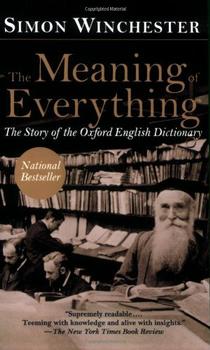Summary | Excerpt | Reviews | Readalikes | Genres & Themes | Author Bio

Critics' Opinion:
Readers' Opinion:
First Published:
Sep 2003, 256 pages
Paperback:
Oct 2004, 286 pages
Not that the people were by then speaking or writing anything that would be very easily recognizable as English. Their language used to be known as Anglo-Saxon; nowadays, in an effort to promote the notion of English as an ever-evolving language, it is more generally called Old English. It was written - at least in its earliest incarnation - in runes, the writing system of intersecting straight lines that had been imported by the invaders. (Three of the runic letters - those corresponding to present-day B, H, and R - look almost identical to the current capital letters. The rest are easily decipherable, but unlike anything written today.) The more sophisticated writers of Old English (such as those in Northumbria) used a system that is now called futhorc, the acronym (much like the word alphabet) for the first six letters of their 31-letter alphabet (with –th ---known as the thorm - being elided into a single symbol).
The vocabulary of Old English - with its total lexicon amounting to perhaps 50,000 words - depended to some degree on borrowings from the available languages that were already being spoken in the British Isles. These were items that came either from d1e vanquished Celts--a tiny number of their British words (crag and dun and the aforementioned brock, combe, and torr among them) still surviving today--or some couple of hundred words coming from the Latin of the departing conquerors (although in most cases these words appear to have been borrowed on the continent before the Anglo-Saxons came to Britain). A fair number of these words- cyse, catte, weall, and straet, meaning cheese, cat, wall, and street in Old English respectively - still exist, albeit in modified form, in today's modern word stock. But for the most part, Old English was a tongue that grew out of its own resources, and these resources reflected in large measure the Germanic origins of the new settlers.
Not a few romantics in modern times have touted the notion of the Teutonically inspired Old English as being the purest form of English ever written and spoken. Dickens, Hardy, and Gerard Manley Hopkins were enthusiastic backers of this idea; in more recent times George Orwell was a great supporter too, and publicly yearned for English to be purged of all its Latin, French, Greek, and Norse loans, and to be centred around and dominated by the short, simpler words that were of an undeniable 'Anglicity' - what some call the 'common words' of the English language. He keenly wanted English, as the sixteenth-century humanist John Cheke had once written, to be 'written cleane and pure, unmixt and unmangled with borrowings of other tunges'.
The Dorset dialect poet William Barnes, much taught at my own Dorchester boarding school, went rather further by creating his own vocabulary of new words, all of them rooted firmly in his beloved Anglo-Saxon. A small number of these - his preference for using faith-heat for enthusiasm, word-strain for accent, and wheelsaddle for bicycle - achieved some success and are to be found in occasional popular use. But given the multiplicity of loanwords on offer, many of them exceedingly pretty to look at and to say, his success in going retro was not quite what he would have liked.
The grammar of England's post-Roman times—of which we know something from studies of great epic poems like Beowulf, or the story of the shepherd-turned-poet Caedmon, as told by the Venerable Bede, or the famous Colloquy written by the eleventh-century Abbot of Eynsham, Aelfric - has a relict Teutonic feel about it. The order of words in a sentence, the inflections at the ends of words signalling the task they perform, both present a language steadily evolving into something very different from Latin, something that approaches the modern idiom but which has much remaining in common with the manner of speech in the north Germany of the time: '... then arose he for shame from the feast,' Aelfric writes, 'when he this answer received.'
Copyright Simon Winchester 2003. All rights reserved. No part of this book may be reproduced without written permission from the publisher, Oxford University Press.





The Funeral Cryer by Wenyan Lu
Debut novelist Wenyan Lu brings us this witty yet profound story about one woman's midlife reawakening in contemporary rural China.
Your guide toexceptional books
BookBrowse seeks out and recommends the best in contemporary fiction and nonfiction—books that not only engage and entertain but also deepen our understanding of ourselves and the world around us.